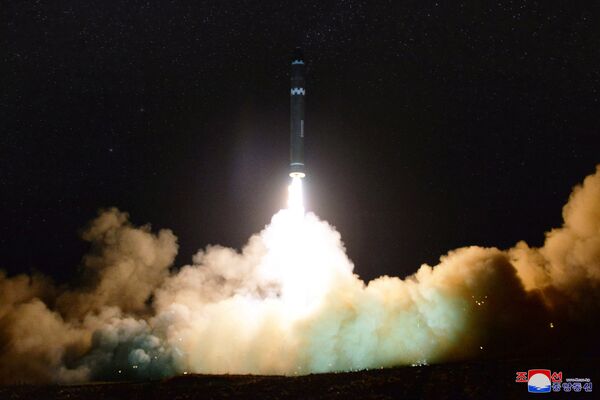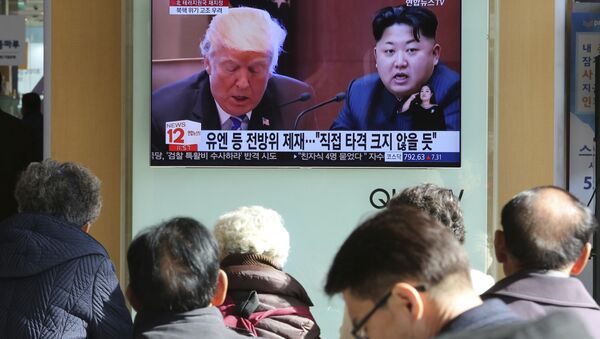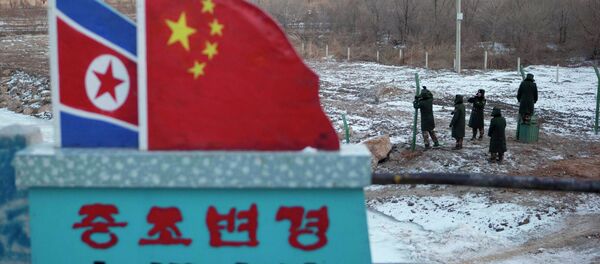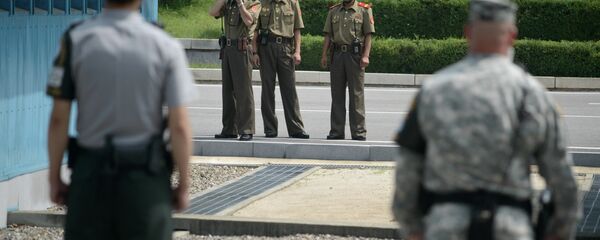After test firing a medium-range ballistic missile in February, North Korea conducted a total of 16 ballistic missile tests, the most number of missile tests within one year. Those missile tests demonstrated the remarkable progress of Pyongyang’s ballistic missile technology both in terms of size, range and payload.
The nation’s most advanced intercontinental ballistic missile (ICBM), known as the Hwasong-15, tested in late November, is estimated to have a range of 13,000 kilometers (8,100 miles). The official Korean Central News Agency (KCNA) said the latest ICBM is also capable of carrying a very heavy nuclear warhead, an area where nuclear experts have doubts about Pyongyang’s capability of miniaturizing nuclear warheads.

With the success of the Hwasong-15, North Korea said it had obtained the capability of striking any part of the mainland of the United States and its latest most powerful ICBM "meets the goal of the completion of the rocket weaponry system development."
Incremental Progress
Despite North Korea’s seemingly unprecedented progress in its nuclear arms program, especially in terms of ballistic missile technology, the nation’s success this year was still a result of incremental progress, as opposed to a major breakthrough, security experts suggested.
"It [North Korea’s success] came from years of technological accumulation and overcoming all kinds of major technological bottlenecks. Based on those previous successful tests, North Korea made noticeable progress this year, which is well within their capabilities. I don’t think North Korea experienced any leaping technological breakthrough. If you follow their specific technologies, such as rocket engines, it’s all part of an incremental progress. Even the new engine that powered the most recent Hwasong-15, the research and development of the engine started years ago, according to reports from US intelligence agencies," Zhao Tong, a fellow at Carnegie’s Nuclear Policy Program at the Carnegie-Tsinghua Center for Global Policy in Beijing, told Sputnik.
The Chinese expert noted that after obtaining technology for medium-range missiles about two years ago, it was a natural and gradual evolution for North Korea to succeed in developing ICBMs.
Missed Chances
After Trump took office earlier this year, North Korea seemed to have had hopes in the newly-elected US president and refrained from conducting provocative missile tests frequently until April, when Trump ramped up his hawkish rhetoric against Pyongyang, the Beijing-based expert suggested.
"North Korea had expectations for Trump when first took office. In the first few months after sworn in as president, Trump did not make key comments regarding to North Korea. His comments during the election campaign that he’s willing to sit down and have a burger with Kim Jong-un gave North Korea some signs of hope," Zhao said.
He pointed out that North Korea was ready to conduct its sixth nuclear test as early as February or March, but postponed it until late summer.
North Korea conducted two missile tests in the first three months of this year. It only started to increase the frequency of its missile tests in April, after Trump unleashed the first wave of hawkish comments against Pyongyang before his first meeting with Chinese president Xi Jinping in Florida.
"China has great influence over North Korea. And China will either decide to help us with North Korea, or they won’t…. If China is not going to solve North Korea, we will," Trump said in an interview published in the Financial Times in early April ahead of his first meeting with Chinese President Xi.
The Chinese expert argued that North Korea changed its attitude as Trump stepped up his aggressive rhetoric.
"It’s very obvious that as Trump continued to send assertive signals, North Korea gave up on its previous position and adopted an aggressive strategy to force the Trump administration to accept the reality of its nuclear status, by demonstrating its improved nuclear and missile capabilities," he said.
READ MORE: Chinese Military Denies Setting Up Hotline on North Korea With US — Reports
Trump’s hawkish rhetoric caused more concerns among the South Koreans than that of Kim Jong-un, Jeffrey Robertson, a visiting fellow at the Asia-Pacific College of Diplomacy of the Australian National University and an assistant professor at Yonsei University in Seoul, told Sputnik earlier this year.
"In South Korea, the view is that Kim Jong Un [North Korea’s leader] is a lot more rational than Trump is. The view here is we know what Kim does, we know what he wants and we know what we have seen. But we don't know what Trump could do. Trump is actually the hideous actor in all of this. This is where the fear comes from in South Korea," Robertson said.
In addition, Zhao believes Trump misinterpreted North Korea’s actions in the beginning of the year.
"North Korea may have viewed the smaller missile tests [took place at the beginning of this year] as not overly provocative. But Trump took them as major provocations and ramped up his hawkish comments in response. Afterwards, North Korea seemed to have changed its policy and was met with stronger rhetoric from Trump," he said.
The war of words between North Korea and Trump reached its peak in August, when Pyongyang threatened to fire missiles toward the US territory of Guam and Trump responded by claiming to meet any North Korean threats with "fire and fury."
China Drifts Further From North Korea
Following the first meeting with Xi and Trump in April in Florida, the Chinese president looked to be onboard with helping the United States to rein in its increasingly provocative neighbor, as the relationship with Pyongyang soured after Kim Jong-un took office in 2011.
Unlike his father and grandfather who kept a close relationship with the Chinese leadership, Kim, a young leader in his 30s, has never visited China after becoming North Korea’s supreme leader. As China failed to convince the younger Kim to abandon the nuclear arms program in North Korea, Chinese leaders could only resort to economic measures to try to contain its neighbor.
China has seemingly stepped up its implementation of United Nations Security Council (UNSC) resolutions on economic sanctions against North Korea after Xi’s meeting with Trump in April. Chinese authorities said that the country has stopped the import of coal produced in North Korea since February 18.
Following a series of missile tests from North Korea, China voted in support of three additional UNSC resolutions on tougher economic sanctions against Pyongyang in August, September and December. Chinese authorities also vowed to strictly enforce those economic sanctions, which aim to force North Korea to give up its nuclear arms program through economic measures.
"The timing of North Korea’s nuclear test is not coincidental. It appears Pyongyang chose to conduct these tests when China hosts important events. It’s something Chinese authorities must think over carefully," Zhang Liangui, an expert on North Korea at the Central Party School, which trains Chinese officials in Beijing, told Sputnik earlier this year.
As the relationship between Beijing and Pyongyang continued to deteriorate, some scholars in China started to call on the Chinese leaders to rethink the North Korean policy and start drafting contingency plans in case of a government collapse in the isolated country. Such views also triggered a heated debate among Chinese academics on whether Beijing should continue to hold onto the idea of viewing North Korea as a strategic buffer zone against the West.
In his comments at the Atlantic Council-Korea Foundation Forum in early December, US Secretary of State Rex Tillerson said the United States assured China that, in case of a military conflict on the Korean Peninsula, US forces would retreat back to the south of the 38th parallel after securing the nuclear weapons North Korea has already developed.
READ MORE: Kremlin: Russia Ready to Be Mediator Between US, North Korea if Parties Want it
Tillerson added that through high-level dialogues with senior Chinese officials, he believes China can manage the possible mass flow of refugees from North Korea in case of a North Korean collapse and Chinese authorities are already taking preparatory actions for such an event.
Zhao, the Beijing-based security expert, expressed grave concerns over possible military conflicts on the Korean peninsula as a result of decisions by hawkish US policymakers.
"I’m really worried the crisis on the Korean peninsula would move toward possible military conflicts as some hawkish US policymakers view the military option as the one-time long-term solution without further complications in the future. Preparatory measures from China can never eliminate all potential risks. If North Korea uses its nuclear weapons in retaliation or nuclear radiation started to leak from North Korean facilities upon US strike, Chinese people would definitely face serious consequences in terms of health and nuclear pollution. The risks are really high," he said.
Russia Seeks to Avoid War
Following President Xi’s state visit to Moscow in July, Chinese and Russian foreign ministries issued a joint statement laying out the roadmap toward resolving the nuclear crisis on the Korean peninsula. Under a policy, known as "double freeze," both countries urged both North Korea and the United States to de-escalate tension by suspending provocative actions.
Shi Yinhong, a professor of international relations at the Renmin University in Beijing, told Sputnik earlier this year that he suspected that Russia seeks to play a bigger role in the North Korea nuclear crisis partly because of its strained relations with the United States and wanted to use keep Pyongyang as a bargaining chip to contain Washington.
But Zhao, the Beijing-based security expert, argued that avoiding a war could be the ultimate purpose of Russia’s policy stance, as provocative actions from both North Korea and the United States make a war look closer than ever.
"Russia believes the western policy of increasing economic pressure against North Korea could lead to completely opposite results and risk further escalating tension. This probably made Russia realize that it needs to express its voices more. I don’t think Russia is trying to play the spoiler here," he said.
Russian Foreign Minister Sergei Lavrov reiterated Russia’s commitment to the denuclearization of North Korea this week.
"Of course, we are seriously concerned with the desire of North Korea to gain nuclear status. We will never accept or approve this. The steps taken by Pyongyang in this direction have the potential of undermining the global non-proliferation regime. In the current tense situation on the Korean peninsula, [such steps] are simply dangerous," Lavrov said.
Never Accept a Nuclear North Korea
As Pyongyang looks more determined than ever to continue to pursue its nuclear arms program and has already obtained sizable nuclear strike capabilities, some political analysts suggested that it may be time for world leaders to face the reality of a nuclearized North Korea and figure out resolutions based on this fact.
READ MORE: North Korea Advises US to Give Up 'Pipe Dream' of Pyongyang Abandoning Nukes
However, US Secretary of State Tillerson explained recently why the United States can never accept North Korea as a nuclear state, not even in a way of acknowledging its nuclear capabilities without officially recognize it.
"The difference is that the past behavior of North Korea, it’s clear to us that they would not just use the possession of nuclear weapons as a deterrent. This would become a commercial activity for them, because we already see elements of it in the commercial marketplace … We can’t accept a nation that has no established record of abiding by any kind of international norms. That certainly was not the case with the Soviet Union. It’s certainly not the case with China… These are countries that have a history of abiding by certain international norms. North Korea has no such record," Tillerson said.
Longtime North Korea watchers noted that it was understandable for the United States to have such concerns.
"To be honest, throughout the nuclear crisis negotiations in the past 20 years, North Korea signed so many agreements. But all those agreements failed to prevent North Korea from developing its nuclear weapons. North Korea has never followed any agreement closely, instead chose to void those agreements unilaterally. For example, the joint statement released on September 19, 2005, following the Six-Party Talks and seven joint statements with South Korea have all been voided by North Korea. It even announced to withdraw from the Korean Armistice Agreement multiple times," Zhang, the expert from the Central Party School in Beijing, said.
Zhang added that all these actions of North Korea make the United States believe that it is useless for the current North Korean government to make any promise.
Zhao, the Beijing-based security expert, believes there is not much China and Russia could do to provide the United States additional assurance to accept a containment strategy against North Korea’s nuclear arsenal.
The views and opinions expressed by Zhao Tong, Jeffrey Robertson and Zhang Liangui are those of the experts and do not necessarily reflect those of Sputnik.





